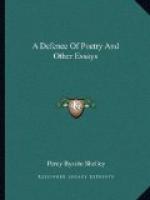Whatever tends to afford a further illustration of the manners and opinions of those to whom we owe so much, and who were perhaps, on the whole, the most perfect specimens of humanity of whom we have authentic record, were infinitely valuable. Let us see their errors, their weaknesses, their daily actions, their familiar conversation, and catch the tone of their society. When we discover how far the most admirable community ever framed was removed from that perfection to which human society is impelled by some active power within each bosom to aspire, how great ought to be our hopes, how resolute our struggles! For the Greeks of the Periclean age were widely different from us. It is to be lamented that no modern writer has hitherto dared to show them precisely as they were. Barthelemi cannot be denied the praise of industry and system; but he never forgets that he is a Christian and a Frenchman. Wieland, in his delightful novels, makes indeed a very tolerable Pagan, but cherishes too many political prejudices, and refrains from diminishing the interest of his romances by painting sentiments in which no European of modern times can possibly sympathize. There is no book which shows the Greeks precisely as they were; they seem all written for children with the caution that no practice or sentiment, highly inconsistent with our present manners, should be mentioned, lest those manners should receive outrage and violation. But there are many to whom the Greek language is inaccessible, who ought not to be excluded by this prudery from possessing an exact and comprehensive conception of the history of man; for there is no knowledge concerning what man has been and may be, from partaking of which a person can depart, without becoming in some degree more philosophical, tolerant, and just.




